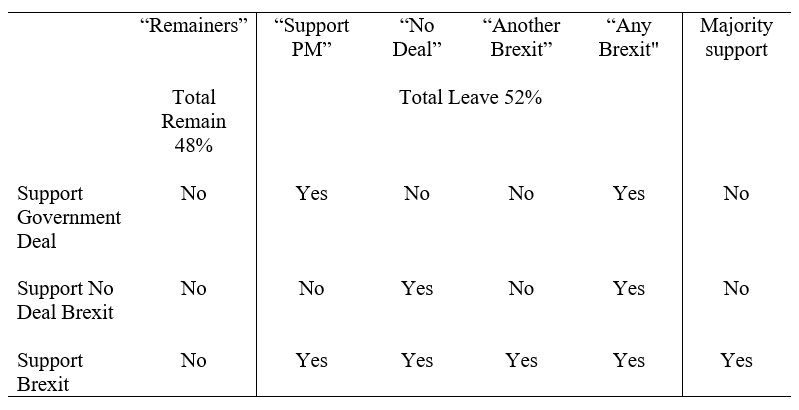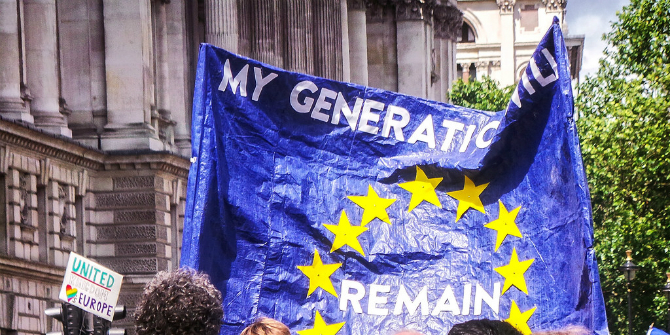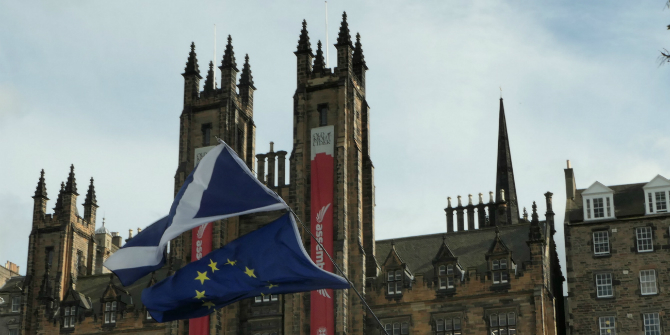 There is deadlock over Brexit because the “will of the People” is contradictory, argues Anthony McGann (University of Strathclyde). The people voted to leave the EU, but do not support any of the feasible Brexit options. This paradox is an example of a social choice problem called the “Discursive Dilemma”. The only way out is a referendum that asks the people exactly what they want.
There is deadlock over Brexit because the “will of the People” is contradictory, argues Anthony McGann (University of Strathclyde). The people voted to leave the EU, but do not support any of the feasible Brexit options. This paradox is an example of a social choice problem called the “Discursive Dilemma”. The only way out is a referendum that asks the people exactly what they want.
Whatever government and Parliament do with Brexit, it will violate “the will of the people”. We voted June 24, 2016 to leave the European Union. However, leaving the EU means either leaving with the Deal negotiated with the EU or a No Deal Brexit. Polls show that a considerable majority prefer staying in the EU to leaving with the Deal. A significant majority also prefer remaining to a No Deal Brexit. Presumably, that is why Parliament will not support either of these options. If Parliament revokes Article 50 and calls off Brexit, it violates the will of the people three years ago. If it votes for the Deal or a No Deal Brexit, it violates the will of the people now.
We are in a deadlock because the people voted to leave the EU, but does not support any of the feasible ways of doing it.

This paradox could simply be due to the fact that public opinion has changed in the last three years, and is no longer in favour of leaving the EU. There is evidence from the opinion polls that there has been a slight movement toward Remain. However, even if the public still supports leaving the EU, it is still possible for a majority to be against both options that make Brexit possible. This kind of paradox is called the “discursive dilemma”. It has been applied to political science by the political philosophers Christian List and Phillip Petitt. Note that this paradox is slightly different from the Condorcet paradox that has been discussed by Simon Kaye and Stephen Fischer. That paradox resulted from a situation where a majority prefers Deal to Remain to No Deal, but prefers No Deal to Deal. The opinion polls show that we do not currently have a Condorcet cycle of this kind.
The most common illustration of the discursive dilemma involves three judges deciding a case by majority rule. It is possible for a majority of judges to decide a case one way, even though they make findings of fact (by majority vote) that logically imply the opposite verdict. Suppose there are three judges.

The judges by a 2-1 majority decide that the accused did the act, and by a (different) 2-1 majority decide that the act was a crime. These findings logically imply the accused is guilty. However, by a 2-1 majority, the judges find he is not guilty. Nevertheless, each individual judge’s beliefs are logically consistent – they find the defendant guilty if and only if they believe the accused did it and it constituted a crime.
The situation with Brexit is slightly different. Given the current political reality, supporting leaving the EU means you must either support leaving with the Deal or support leaving with No Deal (or, of course, support both). It is quite possible for a majority to support leaving the EU, even though a majority rejects both Brexit options. The simple three voter example below illustrates this.

Voter 1 is against Brexit altogether. Voter 2 supports Brexit because they support the Deal (but not a no deal Brexit). Voter 3 support Brexit because they only support a No Deal Brexit. Both Brexit options lose to Remain by two votes to one, but Brexit wins by two votes to one.
Of course, this example is a gross simplification. In reality, 48% of the electorate voted to remain in the EU. Of the 52% who voted to leave, a very large number undoubtedly support both forms of Brexit. There may also be some voted who support neither Deal nor No Deal, but voted Leave because they believed some other kind of deal would be possible. The table below gives this more plausible scenario.

In the scenario, about 48% of the electorate are “remainers”, as in the actual referendum. Unless nearly all of the 52% who voted leave support both Deal and No Deal Brexit, it is entirely possible we have a “discursive dilemma”. That is to say, a majority (52%) supports Brexit, but a majority opposes both leaving with a Deal and leaving with No Deal. We have shown that it is possible for a majority to support leaving the EU, but at the same time reject either of the practical ways of achieving this. Thus we should be really careful about talking about “the will of the people”. But do we have such a paradox in reality?
In the last available opinion poll to ask about support for No Deal, Remain beat No Deal 55%-45% (“don’t know” and “will not vote” excluded). A poll taken by the same organization at the same time (YouGov, 15 March 2019) had Remain beating the Deal 58%-42%. More recent polls have put the margin at least 55%-45%. This is consistent with the “discursive dilemma” paradox. However, most polls now suggest that there is a small majority in favour of not leaving the EU at all (the YouGov poll 19 March 2019 had support for “remain” at 53%).
However, it does not really matter whether there is currently a majority in favour of leaving the EU, because the result of the referendum trumps any opinion poll. Many MPs, including some who supported Remain, feel bound by that result three years ago. The problem is, that current public opinion does matter when they vote on leaving with the Deal or with No Deal. The referendum did not and could not establish that there was a majority in favour of leaving with the Deal or leaving without a Deal. And this is the source of the current deadlock.
The only way out (without disregarding the “will of the people”) is to ask the people exactly what they want. That means a referendum where the people are given the choice between the specific Brexit alternatives and remaining in the EU
This post represents the views of the authors and not those of the Brexit blog, nor the LSE. Image by Stelita. Permission is granted to copy, distribute and/or modify this document under the terms of the GNU Free Documentation License.
Anthony J. McGann is Professor of Government and Public Policy, University of Strathclyde.







Creative accounting.
What is not said is that there was not a three way vote put to the people.
We were asked if we wish to stay or leave the EU.
Now this proposal proposes the scenario
We.are only here because the disrupting behaviour of the remainers who simply will not accept majority vote.
Aided and abetted by Brussels of coarse.
The main argument for the last two years has been that the vote was close.
If it’s close again do we carry in this farce for ever?
Second vote supporters all know that they will rely upon the mood of the country, much like the mood was in 2016.
This increase farce.
Do we go best of any odd number you wish to conjure up?
We employ members of parliament to do a job, if they don’t do it, much like any employee they will loose their job.
Their employers will sack them as will the voters if they see fit. Through the ballot box!!!
That ballot box so hard earned in years past.
That ballot box that we do not get when it comes to voting junker and co into power.
The remain camp are only jumping on the galloping horse, anything and anything to thwart a democratic vote.
No deal? Yep, if it ends as no deal then that will not be the fault of the UK, it will be a result of the EU once again telling us where to get off.
But it will not end as no deal, because dictators they may be but stupid they are not.
The wholesale panick was clear on the last two brinks,. They want our money. Full stop!
If they don’t want it the that’s fine, there’s a queue out there of countries who want it.
It will leave the EU on the brink.
Not us.
pain? Yes
Permanent?
No absolutely everyone agrees after the pain is prosperity, whilst we see the EU in serious decline.
Other countries will then leave and maybe a fully democratic EU will evolve.
We’re doing them a favour, they just don’t know it yet.
What distinguishes a democratic vote from an opinion poll is that a democratic vote must be implemented. If a democratic vote is not implemented, the democracy that held the vote will cease to exist and other, typically violent, forms of political decision-making will replace it.
A second referendum would nullify the decision made in the original referendum before its implementation and we could no longer call ourselves a democracy,.This would be criminally irresponsible.
As for the polls referred to, the overall percentages that favour remain range between 47% and 40%, suggesting even less positive support for remain than was the case in the referendum. It is also worth pointing out that immediately prior to the referendum the polls predicted a remain victory.
Then of course there is the framing of the questions, which seek to divide the Brexit vote but treat the remain preference as a single monolithic entity. Why not ask if people would vote remain if further integration eventually required us to join the Euro or for our military to be absorbed into a united EU military force? Do they want to be part of a United States of Europe or wiould they only want to remain in the EU if there is no further integration. How about expansion? Turkey may yet join the EU .Would that change their mind?
All of these surveys are very heavily weighred to undermine the result of the referendum, which, three years later, has still not been implemented. What is remarkable is how, despite the engineered appearance of chaos and the sustained anti-Brexit propaganda, even these weighted opinion polls can no longer produce an overall majority for remain, which, of course they were able to do consistently before the referendum. This suggests a shift away from remain or at least that some who voted remain care more about democracy than getting their own way over Europe.
We voted to leave the EU and we must leave. It is very straightforward. If we leave without a deal, we definitely leave, and no one who voted leave can claim it was not what they voted for.
Like I said, “the result of the referendum trumps any opinion poll”.
The thing is, though, we are a parliamentary democracy, and parliament has made clear it will not allow a No Deal Brexit. That is why there is deadlock.
The only way you are going to get a No Deal Brexit is to take the decision away from Parliament and put it back in the hands of the people. That means the people voting specifically to leave without a deal in a binding referendum.
The key thing is, the next referendum needs to be binding — if a majority votes to leave without a deal, Parliament needs to have _already_ approved the legislation to leave, so it can happen immediately, without any further intervention by Parliament.
@Anthony McGann: “parliament has made clear it will not allow a No Deal Brexit” This is like saying “Parliament has agreed that UK carbon dioxide emissions will be reduced to zero by 2050”. The majority of MPs may well want to avoid a no-deal Brexit (or indeed a reduction in carbon dioxide emissions) but they can only avoid a no-deal Brexit by voting for either the withdrawal agreement (which I think the EU has made very clear is the only deal on offer) or for Article 50 to be revoked. I don’t see how they are going to do this.
I think the fundamental reason that No Deal is actually rather likely now is that though most MPs do not want it, they do not dislike it more than many of the alternatives. Of course many Tory MPs would, like the Conservative Party in general, like a No Deal Brexit. But I also think the behaviour of the Labour leadership can be most plausibly explained on the hypothesis that they don’t actually think a no-deal Brexit that bad and think it worthwhile if the resulting mess puts Jeremy Corbyn into Downing Street in 2022. Of course they would also be very happy to support a deal which split off Theresa May from almost the whole of the Conservative Party, but Theresa May, being more conscious of her party than Ramsey Macdonald, probably won’t.
On the main point of the article. I don’t think asking the people “exactly what they want” is going to solve anything, because the people are as divided as the Commons. If there is another referendum, I think it is very likely indeed that the losers will not accept the result. And of course even if MPs were to agree in principle that there should be another referendum of some sort, they would be divided on the large number of procedural questions (What are the options? Who gets to vote? How do we avoid collaborations between different groups on the same side like those alleged to have occurred in the 2016 referendum? Will Civil Service neutrality be guaranteed and for how long? What form of preference voting will be used) which will certainly be raised. The fact that this new referendum is supposed to be binding would make the discussion even more heated.
There is currently no parliamentary majority for any form of Brexit and if none is found by October 31st, the default will once again be to leave without a deal or treaty. Since the vote to block no deal is non-binding and the speaker has declared that precedents need not always be adhered to, the Government is not obliged to seek an extension to Article 50; nor, of course, is the EU obliged to grant one.
If there were a confirmatory referendum, it cannot include the remain option since we have already decided to leave. A deal or no deal vote would at least respect the outcome of the 2016 referendum, provided the deal genuinely involved leaving the EU.
A further referendum that included a remain option may in itself lead to serious unrest. Overturning the original result would guarantee it.
Eloquently put.
Nail head!!!!
Thanks Denis. 🙂
It is obvious now that this Parliament is unwilling and unable to deliver Brexit. The Government is unable to govern. In their own words it’s in “deadlock” or “stalemate”. Their answer is either a worse BRINO than the current WA or a Second Referendum. The very fact they wish to, “put it back to the people” is an admission of their failure. The voters dissatisfaction and anger has been clearly demonstrated in the Local Election. If this Parliament, by their own admission, can’t do what has been asked of them then the answer is not a Second Referendum but to Prorogue this Parliament, give us a General Election and give the people the opportunity to elect a Parliament that can! Put that back to the people!